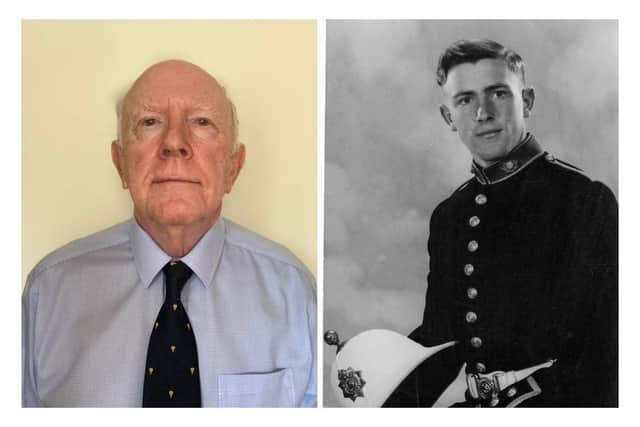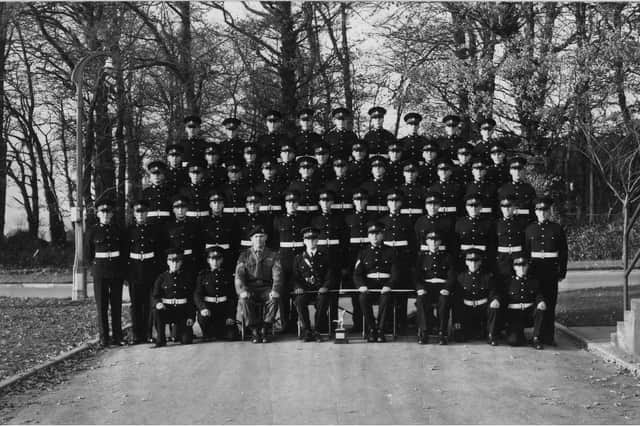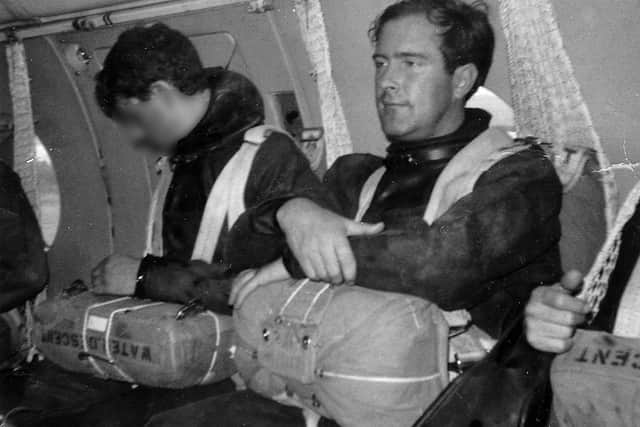National Service: Fareham veteran to join commemoration
and live on Freeview channel 276
The Royal British Legion is holding the service for veterans and their families at the National Memorial Arboretum in Staffordshire on Tuesday6 to acknowledge the service and sacrifices of this generation.
Among those there will be Peter Backlog, of Fareham, who was called up for National Service aged 18 in 1955, and served for two years before joining the Royal Marines Reserves, eventually leaving as a Major in 1983.
Advertisement
Hide AdAdvertisement
Hide AdPeter, now 86, relished his National Service, saying: ‘I really enjoyed it. You could go in with a negative attitude, be shouted at, retreat into your shell, or desert, but if you grab it by the horns, you can really enjoy it – I certainly did. I could never have done some of the things I did without having served in National Service.’


As part of his two years in the Marines, Peter served in the Suez Crisis, joining the amphibious warfare squadron and taking part in Operation Musketeer, for which he received the Naval General Service Medal. He also served in Malta.
Peter will be attending the RBL’s ‘Remembering National Service’ event, where he will wear his Royal Marine green beret again, saying ‘Once a Royal Marine, always a Royal Marine.’
Peter’s parents were both in the RAF during the Second World War and Peter was in the Combined Cadet Force at his school.


Advertisement
Hide AdAdvertisement
Hide AdDuring this time, having just turned 18, he joined the Royal Marine Forces volunteer reserve, almost guaranteeing him to get into the Royal Marines.
Later, he served in Denmark and Malaysia too, and also served as part of the Special Boat Service Reserves.
Peter, who is married and has a daughter, a step-daughter, and grandchildren, recalled that on the day he was called up he received a letter.


‘I got my letter to the post, with a rail warrant telling me to get to Topsham Station on the due date and went by truck to a RM Training unit at Lympstone,’ he said. ‘This confirmed I would be called into the Royal Marines as I was as voluntary reservist.
Advertisement
Hide AdAdvertisement
Hide Ad‘You attend the Royal Marines training centre, which included a fairly intensive assault course, completing advanced infantry training with tests like a nine-mile, speed march in 90 minutes, "Tarzan” rope system etc.
‘The Royal Marines pride themselves, one minute you’re covered in mud on an assault course and the next minute on parade in your blues. So, you were always practising changing drills.
‘In training I was being shouted at saying “Yes, Colour Sergeant!”. I was lucky enough to get commissioned and I went to Eton Hall Officer Cadet School where you’re mixed with the Army and being shouted at a lot, mainly by Guards SNCOs! I was lucky to get back into the RM (about 50 per cent had to swap to the Army. I then did an Officer Qualifying Landing Craft course, where I learned who how to control and plan landing craft and ships if you were doing an amphibious attack from sea to land.
‘If you were lucky enough to get a commission in National Service, you had to do four years in the Reserve. I quite liked that and I stayed in the Royal Marines Reserves until 1983, where I ended up as a Major.
Advertisement
Hide AdAdvertisement
Hide Ad‘To sum up my time in National Service, I was fully trained as a Royal Marine, lucky enough to get commissioned, I took part in the Suez Campaign, and then spent the rest of my time in Malta training other people.’
‘Either you liked the discipline, or you didn’t. they did go to some extremes; if you had a speck of dirt or dust on your rifle, you were in trouble which was a bit unfair!’
‘There was no question of disobeying orders, it wasn’t a wise thing to do! I never had an issue with it though, that’s just how it was and I got on with it.’
But there are also sombre memories: ‘I also remember, at Port Said, just after the ceasefire, I was visiting the headquarters ship and I saw a Padre carrying two or three white crosses. That’s when I saw the name of a guy that I’d done my training with – CE (Sid) Goodfellow. There was a squad mate of mine with his name on the white cross. It was a little sad to see one of your mates’ names there.’
Peter said that National Service ‘vastly improved’ his life.
Advertisement
Hide AdAdvertisement
Hide Ad‘The first thing taught in the Royal Marines was how to wash yourself properly, make the bed, wash your clothes. I’d done it before, but a lot of people hadn’t. It teaches you everything you need to know as you start to grow up.
‘A huge emphasis in RM training and ethos is “never give up” and this has remained with me. It did me the world of good, I couldn’t praise it further. I really enjoyed it. You could go in with a negative attitude, be shouted at, retreat into your shell, or desert, but if you grab it by the horns, you can really enjoy it – I certainly did. I could never have done some of the things I did without my service.
‘Later on in the Reserves I qualified as a SC Officer so learned to dive, use all NATO and foreign weapons, parachuting etc. I also was an usher at Lord Mountbatten’s funeral in 1979 and attended a Staff Course with the US
Marines Reserve at Quantico, etc. It taught me to look after myself and be resilient. Once a Marine, always a Marine. I’m still a Marine now.’
Advertisement
Hide AdAdvertisement
Hide AdAnd he is a staunch advocate of National Service: ‘I’d say to bring it back! I don’t think it would do any harm to bring it back. I know it doesn’t suit everybody, but I think it’s good for young people to get away from home and away from parents for the first time.’